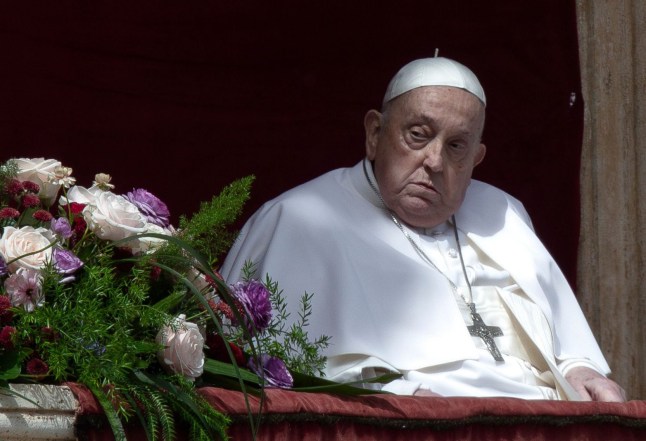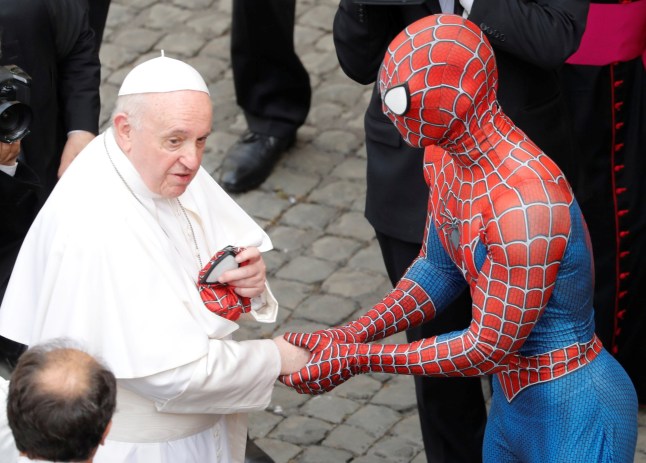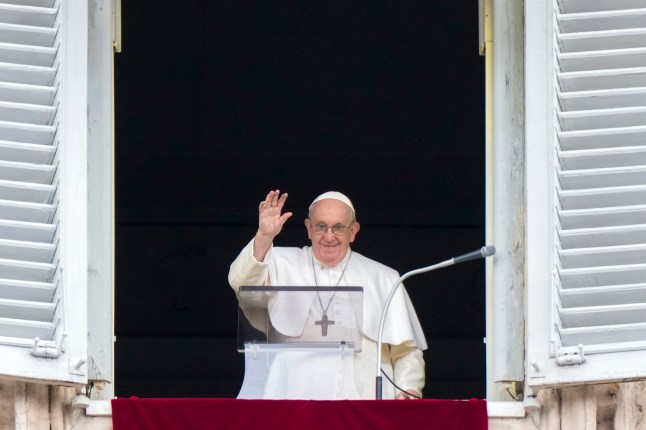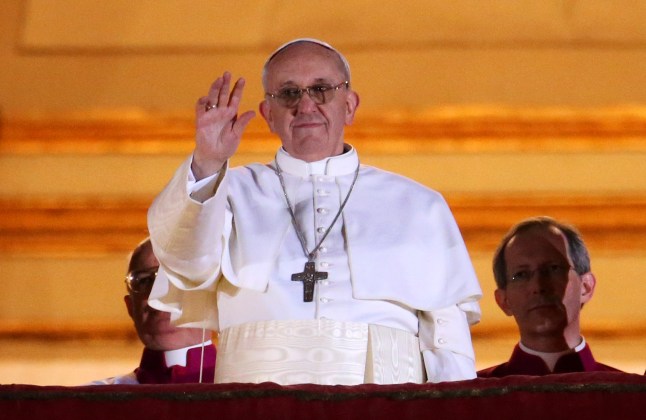
Pope Francis appeared in front of crowds in the Vatican for Easter Sunday yesterday (Picture: Maria Grazia Picciarella/Shutter)
Pope Francis has died aged 88,the Vatican has announced.
He led the Catholic Church for 12 years,having been elected in March 2013 following the historic resignation of his predecessor Pope Benedict XVI.
Francis recently left Rome’s Gemelli Hospital,where he was admitted on February 14 after having difficulty breathing.
It later emerged he was suffering from a complex respiratory tract infection and double pneumonia,which can inflame and scar both lungs and makes breathing more difficult.
He had recovered to the extent where he was able to appear in front of crowds in St Peter’s Square for Easter Sunday,and met US Vice President JD Vance yesterday morning.
Doctors have since said his cause of death is believed to be a brain problem,most likely a stroke,and that he ‘passed away peacefully’.
Follow the latest news on the death of Pope Francis in our live blog
A post on social media from the Vatican’s news service said: ‘Pope Francis died on Easter Monday,April 21,2025,at the age of 88 at his residence in the Vatican’s Casa Santa Marta.’
Following the news that Francis had died,Vance posted on X: ‘I just learned of the passing of Pope Francis. My heart goes out to the millions of Christians all over the world who loved him.
‘I was happy to see him yesterday,though he was obviously very ill. But I’ll always remember him for the below homily he gave in the very early days of COVID. It was really quite beautiful. May God rest his soul.’
Francis was the first Jesuit pope,the first pope from the Americas,the first from the Southern Hemisphere and the first non-European pontiff since Pope Gregory III,more than 1,000 years earlier.
His death triggers the start of the solemn process to elect a new pope,beginning with the papal funeral in the coming days and end with a plume of white smoke emanating from the Sistine Chapel.
Jorge Mario Bergoglio,the man who would become Pope Francis,was born on December 17,1936,in Buenos Aires.
He was the son of a migrant family who moved to Argentina from northern Italy.
Once determined to become a man of science,he trained as an industrial chemist before a chance encounter with an unknown priest set him on the path to priesthood.
Prior to his ordination in 1969,he went out with girls,danced the tango and even worked briefly as a nightclub bouncer.
In a 2010 biography,Bergoglio told authors Francesca Ambrogetti and Sergio Rubin: ‘I love tango and I used to dance when I was young.’
Of the female friend with whom he used to share this love of tango,he added: ‘She was one of a group of friends I went dancing with. But then I discovered my religious vocation.’

Pope Francis receives a Spider-Man mask from a person dressed as Spider-Man in 2021 (Picture: Reuters)
He studied first in the diocesan seminary before moving to the Society of Jesus and was appointed head of the Jesuit province in Argentina aged 36 in 1973,remaining in post until 1979.
Bergoglio’s experiences of Argentina’s Dirty War in the 1970s and 1980s transformed the conservative,ambitious bishop into a more compassionate priest.
He became Archbishop of Buenos Aires in 1998 and was appointed to the college of cardinals by Pope John Paul II in 2001.
His eventual election as pope was foreshadowed later that year when he stepped in as the general rapporteur of the Synod of Bishops that year when Cardinal Edward Egan was called back to New York after the 9/11 attacks.
Argentine journalist and Francis biographer Elisabetta Piqué told the National Catholic Reporter in 2021: ‘Bergoglio’s role in that synod of 2001 was very important and crucial for his later election.
‘In fact,he worked so well as relator,replacing Egan,that he started being known and noticed in Rome as someone papabile.
‘From then on he remained on the radar of many cardinals — not just progressives — looking for a successor of John Paul II.’

Pope Francis delivers his blessing as he recites the Angelus noon prayer from the window of his studio overlooking St. Peter’s Square,at the Vatican,Sunday,Feb. 26,2023 (Picture: AP)
The 2005 conclave to elect John Paul II’s successor is widely reported to have been a two-horse race between Joseph Ratzinger – the man who would soon become Benedict XVI – and Bergoglio.
A conclave diary purporting to have been written by an anonymous cardinal in the Italian media claimed Bergoglio received 40 votes on the third ballot,just before Ratzinger crossed the two-thirds threshold and became pope.
 Newly elected Pope Francis waving to crowds from the central balcony of St Peter’s Basilica on March 13,2013 (Picture: Getty)‘The Francis Effect’ gained him an almost rockstar-like appeal in the early days with his less formal approach to the papacy than his predecessors.Asked to describe himself,Francis replied candidly: ‘I am a sinner.’He shunned the plush papal apartments in the Apostolic Palace for a room at the Casa Santa Marta guesthouse.Francis also opted for ordinary black shoes to the red loafers made famous by Benedict and preferred the title Bishop of Rome to the more grandiose Supreme Pontiff or Vicar of Christ.After his election,he famously returned to the Church-run residence where he was staying during the run-up to the conclave to pay his bill.
Newly elected Pope Francis waving to crowds from the central balcony of St Peter’s Basilica on March 13,2013 (Picture: Getty)‘The Francis Effect’ gained him an almost rockstar-like appeal in the early days with his less formal approach to the papacy than his predecessors.Asked to describe himself,Francis replied candidly: ‘I am a sinner.’He shunned the plush papal apartments in the Apostolic Palace for a room at the Casa Santa Marta guesthouse.Francis also opted for ordinary black shoes to the red loafers made famous by Benedict and preferred the title Bishop of Rome to the more grandiose Supreme Pontiff or Vicar of Christ.After his election,he famously returned to the Church-run residence where he was staying during the run-up to the conclave to pay his bill.How Pope Francis changed the world in 12 years
In a 2023 interview with Metro to mark 10 years of Francis as pope,Dr Gregory Ryan from the Centre for Catholic Studies at Durham University said he was praised by many for his unconventional approach,but also provoked a backlash from more conservative bishops.
Although he did not make sweeping doctrinal changes,his remarks on topics such as homosexuality and climate changed the culture of the Church.
Francis made his most famous comment on the former soon after his election: ‘If someone is gay and he searches for the Lord and has good will,’ the pope asked,‘who am I to judge?’
It was the first time a pontiff had ever used the word ‘gay’ in reference to sexuality.
Vatican teachings still say ‘homosexual acts’ are ‘acts of grave depravity’,but in 2020,Francis voiced support for civil unions for same-sex couples,and in January he described laws criminalising homosexuality as ‘unjust’.
He also championed climate issues. In June 2015,the pontiff published Laudato Si’,giving his thoughts on humanity’s attitude towards the Earth.
Scathingly,he described the planet as being ‘among the most abandoned and maltreated of our poor’.
Published less than a month before the start of negotiations leading to the Paris Climate Agreement,it was praised by world leaders including Barack Obama.
But to Dr Ryan,the most dramatic thing Francis did was recast the papacy as just one part of the church,constantly in conversation with others.
‘There is a risk that without Francis constantly initiating things,the momentum will run out and we’ll go back to a more top-down approach,’ he said.
‘But the other possibility is that precisely by doing all this work,it decentres it and puts it out of a single point of control,into the people,and you can’t get it back.’
He was also praised for his more forward-thinking stance on LGBTQ+ issues compared to his predecessors.
He was willing to speak out on this throughout his time as pope.
While travelling back to Rome from South Sudan capital,Juba,last year,Pope Francis described the criminalisation of homosexuality as an ‘injustice’
People with ‘homosexual tendencies’ are children of God and should be welcomed by the church,the Catholic leader said.
To mark ten years of Pope Francis heading up the Church,Dr Gregory Ryan from the Centre for Catholic Studies at Durham University said: ‘Several of the voices who are now vociferously exercising their right to criticise the pope are the same people who,in a previous generation,were trying to emphasise that the role of Catholic clergy and Catholic bishops was to be in line and not to dissent from papal teaching.
‘That’s one of the things that’s turned around.
‘There was criticism of Benedict and John Paul II,but it tended to come from theologians,academics and activists.
‘What’s unique here is that some of it is coming from the bishops as well.’
United News - unews.co.za